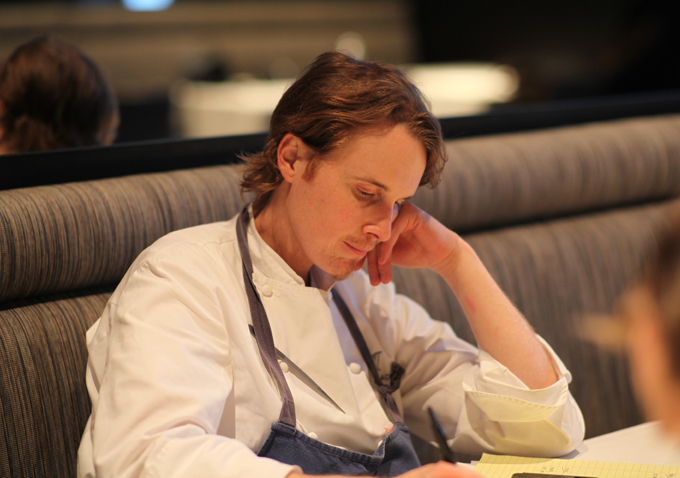
What it means to dine out has changed profoundly over the last few decades. This week The New York Times reported on the closure of Hilltop Steak House, a western-themed restaurant just outside of Boston, which had been open since 1961. It perfectly reflects the sort of post-war ideal of what the restaurant was at the time, a roadside destination, offering big servings of hearty food that people recognized. If you wanted a big sirloin steak, this place offered it and then some. But in an era of organic, artisinal, tasting menus, farm-to-table, rustic and other adjectives which describe the micro-genres of eating options available to the casual diner, something like Hilltop Steak House is positively antiquated. Restaurants these days seem to have to mean something more than just the food they’re serving, and in Joseph Levy‘s “Spinning Plates,” he serves up a trio of stories that illustrate the varied face of eating out.

Alinea best represents an extreme example of fine dining. One of the best restaurants not only in North America, but the world, head chef Grant Achatz at least acknowledges that much of what he does is “absurd.” Blurring the line between food and art, he takes a nearly post-modern approach to cuisine, constructing dish and meals, that sometimes require hours upon hours of preparation for what will ultimately only be a couple of bites. Boasting a kitchen that could easily be mistaken for a science lab, Achatz excels at molecular gastronomy, which is in essence, finding completely new ways to extract and present flavor, usually in food that arrives at the table in shapes, sizes and color a diner has never seen before. Achatz’s work is ambitious, daring, challenging, expensive and acclaimed. The current menu at the restaurant consists of an eighteen-course meal that will set you back $210 before you even factor in drinks and a tip. Alinea is dining as a pure experience; it’s as much a night at the opera as it is a meal.
Meanwhile, at Breitbach’s Country Dining, it’s continued existence and success goes far beyond the food on the table (which is made-from-scratch, pure comfort food from fried chicken to home-baked pies). Founded in 1862 by German immigrants, the restaurant is now in its sixth generation of family ownership, but more importantly, has become a lynchpin to the town to Balltown, Iowa. A sign outside the restaurant reads “Gathering Place,” and indeed it serves as a defacto town hall in some regards, and is collectively cared for by people outside the family. More than a half dozen citizens have keys for the front door, and often open up the restaurant themselves in the morning, helping with small jobs around the place, free of charge. It’s a small way to repay Mike Breitbach, the current owner, who acts as the community’s guardian angel, making sure that no resident who needs a helping hand or a plate food, goes without support. Breitbach’s Country Dining is about food as a communal bond.

Lastly, La Cocina de Gabby, is the kind of restaurant that often gets overlooked in the chase to find the next new trend. Run by a husband and wife team, Francisco and Gabby, there are no gimmicks or pretense here. The decor is simple if not spartan, and the menu is unmistakable: authentic Mexican food, no more, no less. As chef Gabby shares, she’s often told that her food reminds customers of something their mother or grandmother made, and her secret ingredient is nothing more than passion. But is that belief enough to keep things going through difficult times?
That becomes the central question in Levy’s low-key, enjoyable documentary. Each of these chefs and restaurants face roadblocks, some of them dire and life-threatening, but “Spinning Plates” presents the people who run these establishments possessing not just steely, but caring personalities. What emerges from the high-wire artistry of Achatz to the homespun, modest goals of Francisco and Gabby, is a thoughtfulness and true appreciation for their craft, and what it means not only for their customers, but also their families. Success for everyone involved is not just their own personal legacy, but how that will be passed on to their children and those that follow in their footsteps.”Spinning Plates” navigates an industry that is more diverse and challenging than ever, but with this simple, fulfilling sampling, we learn that those behind the stove aim for the same kinds of rewards, accomplishments and satisfaction as their predecessors did. [B]

